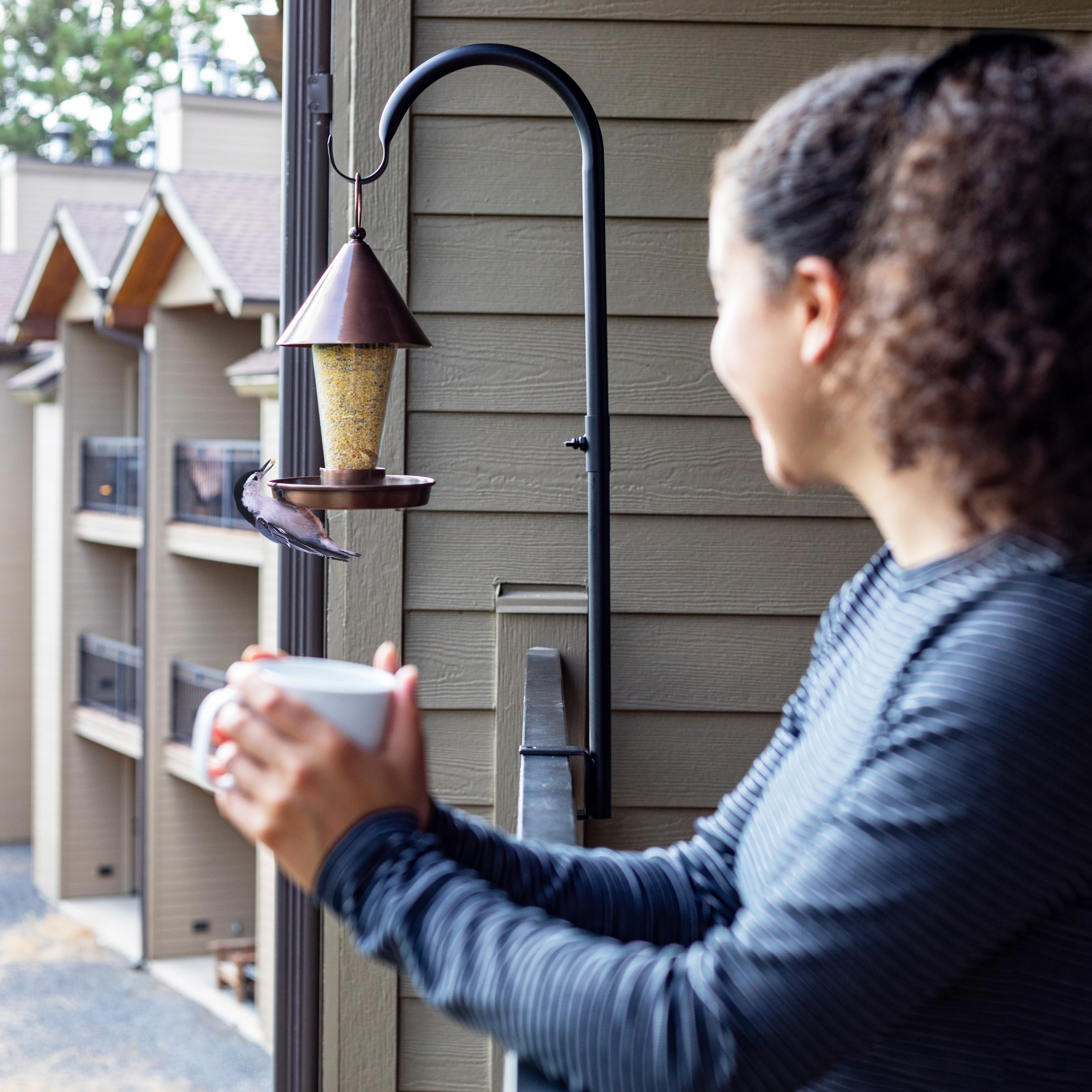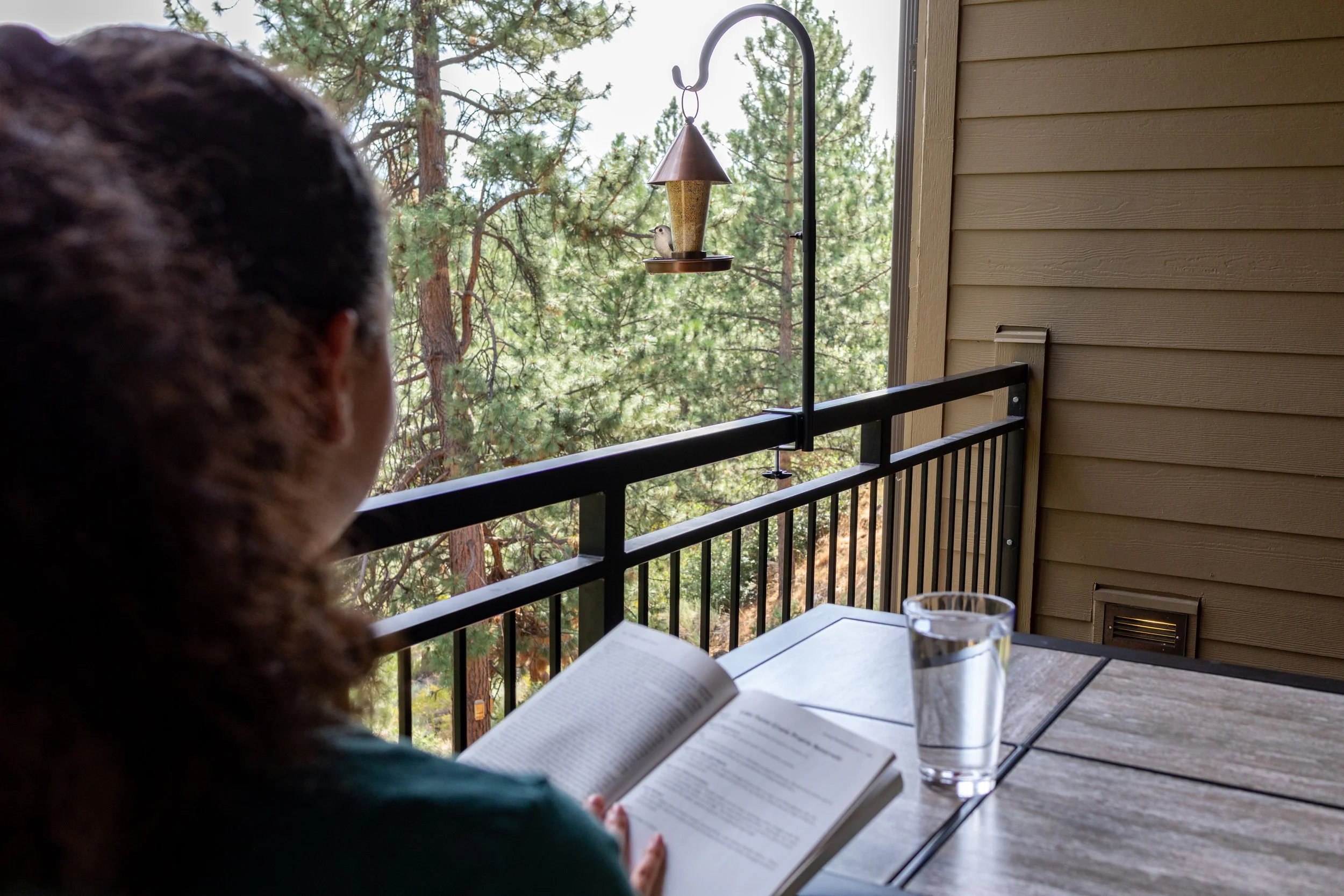Backyard Birdwatching for Mental Wellbeing
Invite wild birds to help recharge your mind, body, and spirit by practicing Ornitherapy
By Holly Merker
About the Author: Holly Merker has a background in art therapy; Merker now employs birds and nature to achieve the same result for of mental, physical, and emotional wellness in her work as a Mindful Birding leader and certified Nature and Forest Therapy Guide (ANFT).
It’s easy to love wild birds. They can be colorful, beautifully patterned, charismatic, and offer wonderful seasonal soundtracks to our landscapes and lives. In addition to these gifts they provide, research shows that living around wild birds, and inviting them into our yards and neighborhoods, can bolster our wellbeing and provide positive benefits for our mental health.
When we invite wild birds in closer to us by creating a bird friendly environment and they visit our bird feeders, native plants, water features, and nest boxes, they connect to us in a way that often becomes personal. In fact, some would say they have become part of our extended family.
If you are a wild bird lover, you may have already noticed or experienced the positive effects wild birds have on physical and mental health. Perhaps it's the joy they bring us by their mere presence or the act of caretaking that makes us feel positive and hopeful. It could also be the simple act of walking outdoors to fill a feeder that makes us feel better. When a bird captures our attention, we temporarily forget about what's going on in our own lives; research demonstrates that this sort of “attention redirection” is positive for our busy minds. Birds are the perfect gateway to change our mental channel, offering a positive distraction that provides a boost to our mood.
My Personal Experience
Confronted with a health crisis, I became keenly aware of the many benefits to my own personal wellbeing that birds can provide. As a young mom, I was thrown into the overwhelming grip of an unexpected breast cancer diagnosis. It came at a time when our family was already dealing with other difficult issues, including a middle east deployment for my husband, a Navy reservist, and compression fractures of my spine due to a sledding accident. But I was lucky because I already had birds in my life. As a busy mom, birds gave me relief and the ability to recharge. I began to find companionship with birds in a new way. They offered me a sense of grounding and peace. Best of all, they were non-judgmental of all the changes to my body and the rollercoaster of emotions surrounding the diagnosis. Birds allowed me to be myself. They provided me with hope and inspiration. When I lost my hair to chemo, I offered it to the birds as nesting material by stuffing it into a suet cage hanging outside my kitchen window. I got lucky one day while doing dishes, because a Tufted Titmouse curiously tugged at the hair, eventually carrying it off to most likely line her nest. In that moment, the grief of losing my hair lessened, and I experienced hope. My wasted hair would now be repurposed for new life. And for me, this inspired me to look at the situation through a different lens. A lens of hope and optimism towards life in general.
We can all find these glimmers of hope and inspiration with wild birds as our guides and teachers, if only we are open to it. Perhaps you have also found hope, joy, or inspiration through the birds in your own backyards?
Finding Wellness Benefits through Birdwatching
Science shows us that we don’t have to go far to benefit from the healing powers of nature. It's always so much fun to discover new species in our backyards, and research shows that the more birds we are surrounded by, the better it is for our overall wellbeing. Simply being surrounded by biodiverse habitats with birds and birdsongs can provide relief from stress and anxiety and lower our cortisol levels while boosting our feelings of wellbeing. Studies also show bird feeding helps us feel more connected to the world around us. And as we observe birds, we feel more relaxed. A natural dose of calm is easily obtained by taking time out of our busy day and allowing ourselves a few minutes to practice selfcare through what I like to call ornitherapy – allowing birds to offer wellness benefits and positive recharge to our mind, body, and spirit.
Practicing ornitherapy encourages us to slow down and notice things we might otherwise overlook in our fast-paced lives. While embracing ornitherapy as a practice of selfcare, we get to know birds as we would a new and interesting friend.
Ornitherapy is simple and doesn’t take much of our time. We can easily practice it in our own backyards and neighborhoods, and even through our windows. Something I like to do, especially when I’m feeling stressed or anxious, is to set time aside – even if it’s just a few minutes – to turn my attention toward birds. I encourage you to try it, too!
How to Practice Ornitherapy
Pull up a chair, or something to sit on, and settle into a place that offers a view (outdoors is best, but indoors works, too).
As you sit there, envision yourself becoming part of the natural landscape ─ just like the plants, birds, and other animals.
Gently close your eyes and listen quietly for a minute or two.
Ask yourself, “What am I noticing?” (When we are intentional in directing our attention onto sounds, patterns, and melodies, we might notice things that otherwise would have escaped us.)
Slowly open your eyes. Colors may be amplified, shapes crisper, and you will be more attuned to the birds around you. You’ll also notice the birds might come in closer as you relax, magnifying your experience with them.
This designated time away from life’s pressures allows birds to recharge us and sparks our wonder and curiosity, and we only need to carve out a few minutes a day to experience these benefits.
When we give ourselves time to invite birds to be a part of our selfcare, it’s mutually beneficial for us and the birds. As you think about your backyard birds and the care you provide them, remember that this is a reciprocal relationship. Wild birds take care of us as much as we take care of them. They, too, help us thrive and enjoy a happier and healthier life.
Sources cited for this post:
Buxton, R.T., Pearson, A.L., Lin, H.-Y., Sanciangco, J.C. & Bennett, J.R. (2023) Exploring the relationship between bird diversity and anxiety and mood disorder hospitalization
rates. Geo: Geography and Environment, 10, e00127. Available
from: https://doi.org/10.1002/geo2.127
Cox DT, Gaston KJ. Urban Bird Feeding: Connecting People with Nature. PLoS One. 2016 Jul 18;11(7):e0158717. doi: 10.1371/journal.pone.0158717. PMID: 27427988; PMCID: PMC4948881.
Cox, D.T., Shanahan, D. F., Hudson, H.L., Plummer, K.E., Siriwardena,G.M., Fuller, R.A., n Anderson, K., Hancock,S., Gaston, K.J.. (2017). Doses of neighborhood nature: The benefits for mental health of living with nature. BioScience, 2017; biw173 DOI: 10.1093/biosci/biw173
Ohly H, White MP, Wheeler BW, Bethel A, Ukoumunne OC, Nikolaou V, Garside R. Attention Restoration Theory: A systematic review of the attention restoration potential of exposure to natural environments. J Toxicol Environ Health B Crit Rev. 2016;19(7):305-343. doi: 10.1080/10937404.2016.1196155. Epub 2016 Sep 26. PMID: 27668460.
Stobbe, E., Sundermann, J., Ascone, L., Kuhn, S. (2022) Birdsongs alleviate anxiety and paranoia in healthy participants. Sci Rep 12, 16414 (2022). https://doi.org/10.1038/s41598-022-20841-0



